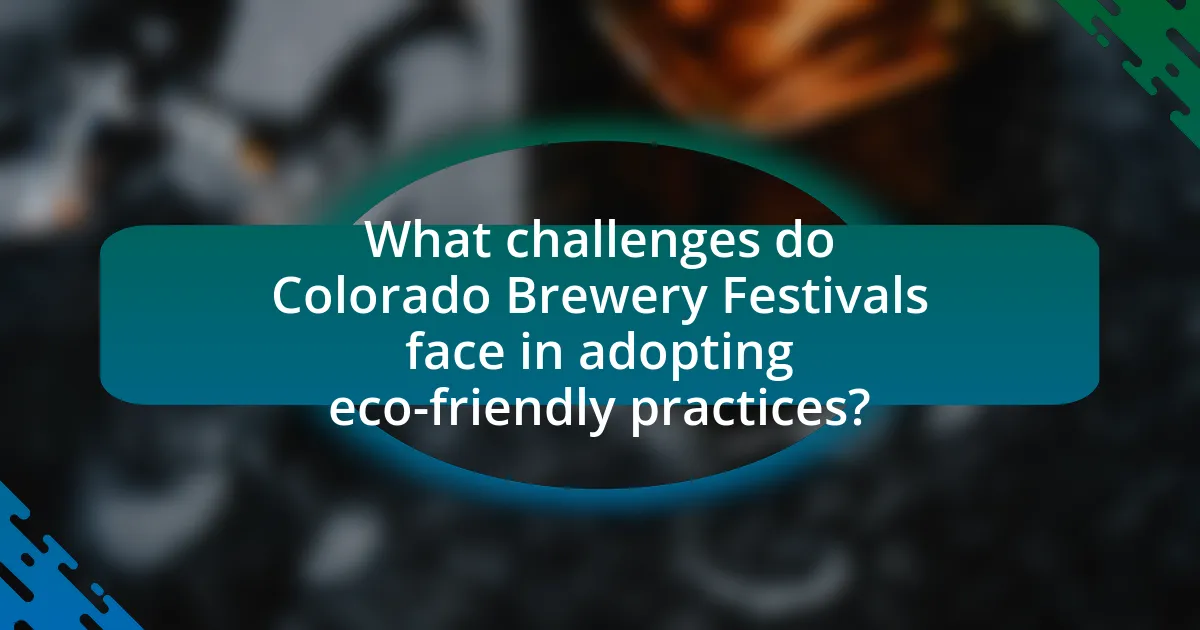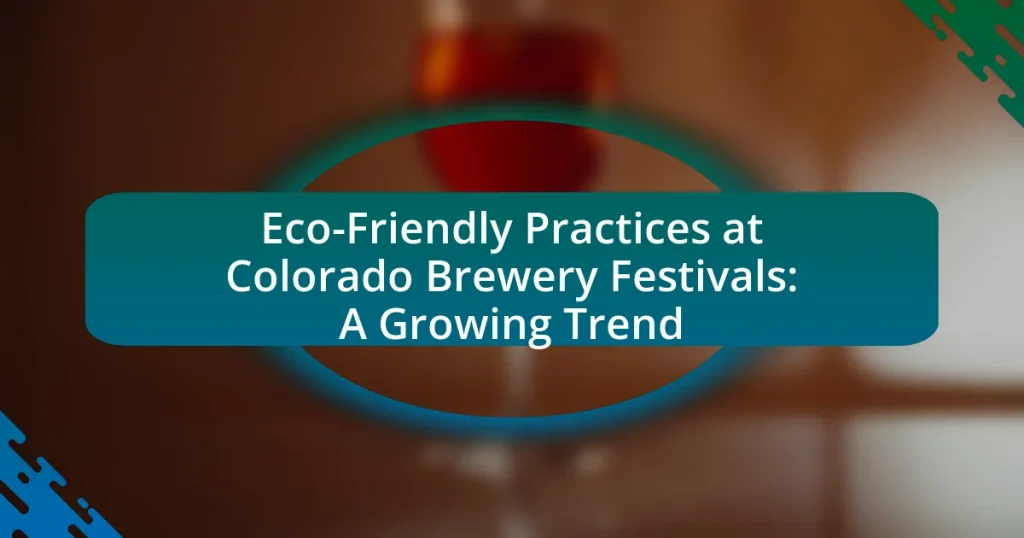Eco-friendly practices at Colorado brewery festivals are increasingly being adopted to promote sustainability and reduce environmental impact. Key initiatives include waste reduction strategies, recycling programs, and the use of biodegradable materials, with many festivals encouraging the use of reusable containers. Breweries are also focusing on local sourcing of ingredients and energy-efficient technologies to minimize their carbon footprints. The article explores how these practices are implemented, the benefits they provide to both the environment and local communities, and the challenges faced by festival organizers in adopting sustainable measures. Additionally, it highlights the role of consumer preferences and partnerships in driving the trend towards eco-friendly operations within the brewing industry.

What are Eco-Friendly Practices at Colorado Brewery Festivals?
Eco-friendly practices at Colorado brewery festivals include waste reduction initiatives, recycling programs, and the use of biodegradable materials. Many festivals implement strategies such as encouraging attendees to use reusable cups and containers, which significantly decreases single-use plastic waste. Additionally, some festivals partner with local organizations to ensure proper recycling and composting of waste, aiming for zero waste goals. For instance, the Great American Beer Festival has adopted measures to minimize environmental impact by promoting sustainable transportation options and sourcing local ingredients, thereby reducing carbon footprints associated with transportation. These practices reflect a growing trend among breweries and festival organizers to prioritize sustainability and environmental responsibility.
How are these practices implemented at festivals?
Eco-friendly practices at Colorado brewery festivals are implemented through various strategies aimed at reducing environmental impact. These strategies include the use of biodegradable cups and utensils, which minimize plastic waste, and the establishment of recycling and composting stations to ensure proper waste management. Additionally, many festivals promote local sourcing of ingredients, which reduces carbon footprints associated with transportation. According to a 2022 report by the Colorado Brewers Guild, 75% of participating breweries adopted at least one sustainable practice, demonstrating a significant commitment to eco-friendly initiatives.
What specific eco-friendly initiatives are commonly adopted?
Commonly adopted eco-friendly initiatives include waste reduction strategies, such as implementing recycling and composting programs, and the use of biodegradable materials for cups and utensils. Many breweries also adopt energy-efficient practices, like utilizing solar panels and energy-efficient brewing equipment, which can reduce their carbon footprint. Additionally, sourcing local ingredients minimizes transportation emissions and supports local economies. According to a 2022 report by the Brewers Association, 74% of craft breweries in the U.S. have adopted at least one sustainable practice, highlighting the growing trend towards eco-friendly operations in the brewing industry.
How do breweries measure the effectiveness of these practices?
Breweries measure the effectiveness of eco-friendly practices through metrics such as waste reduction, energy consumption, and water usage. By tracking the volume of waste diverted from landfills, breweries can quantify their recycling and composting efforts. Additionally, monitoring energy consumption before and after implementing sustainable technologies, like solar panels or energy-efficient brewing equipment, provides insight into energy savings. Water usage metrics help breweries assess the impact of water conservation initiatives, often leading to reduced operational costs. These measurements are supported by industry reports indicating that breweries adopting sustainable practices can see a 20-30% reduction in operational costs over time.
Why is there a growing trend towards eco-friendly practices?
There is a growing trend towards eco-friendly practices due to increasing awareness of environmental issues and consumer demand for sustainable options. Research indicates that 66% of global consumers are willing to pay more for sustainable brands, reflecting a shift in purchasing behavior towards products that minimize environmental impact. Additionally, regulatory pressures and initiatives aimed at reducing carbon footprints are prompting businesses, including those in the brewery sector, to adopt eco-friendly practices. This trend is further supported by studies showing that sustainable practices can enhance brand loyalty and attract a broader customer base, making eco-friendliness not only a moral choice but also a strategic business decision.
What environmental issues are breweries addressing through these practices?
Breweries are addressing water conservation, waste reduction, and energy efficiency through eco-friendly practices. These practices include implementing water recycling systems, utilizing spent grains for animal feed, and adopting renewable energy sources like solar power. For instance, breweries can reduce water usage by up to 30% through efficient brewing techniques and recycling processes, thereby mitigating the strain on local water resources. Additionally, by diverting waste from landfills and reducing energy consumption, breweries contribute to lower carbon footprints and promote sustainability within their communities.
How do consumer preferences influence this trend?
Consumer preferences significantly influence the trend of eco-friendly practices at Colorado brewery festivals by driving demand for sustainable options. As consumers increasingly prioritize environmental responsibility, breweries are responding by adopting practices such as using biodegradable materials, sourcing local ingredients, and implementing waste reduction strategies. A survey conducted by the Brewers Association in 2022 indicated that 70% of craft beer consumers prefer brands that demonstrate a commitment to sustainability. This shift in consumer behavior compels breweries to innovate and align their offerings with eco-conscious values, thereby reinforcing the trend towards sustainability in the industry.

What are the benefits of Eco-Friendly Practices for Colorado Brewery Festivals?
Eco-friendly practices for Colorado brewery festivals provide significant benefits, including reduced environmental impact, enhanced community engagement, and improved brand reputation. By implementing sustainable measures such as waste reduction, recycling, and the use of local ingredients, festivals can minimize their carbon footprint and conserve natural resources. For instance, a study by the Colorado Department of Public Health and Environment found that events adopting eco-friendly practices can reduce waste by up to 50%, demonstrating a tangible positive effect on the environment. Additionally, these practices foster a sense of community among attendees who value sustainability, leading to increased participation and support for local businesses. Furthermore, breweries that prioritize eco-friendly initiatives often experience a boost in their brand image, attracting environmentally conscious consumers and differentiating themselves in a competitive market.
How do these practices impact the local community?
Eco-friendly practices at Colorado brewery festivals positively impact the local community by promoting sustainability and enhancing community engagement. These practices, such as waste reduction, recycling initiatives, and the use of local ingredients, foster environmental awareness among attendees and encourage responsible consumption. For instance, a study by the Colorado Department of Public Health and Environment found that festivals implementing recycling programs can reduce waste by up to 30%, directly benefiting local ecosystems. Additionally, these practices often lead to increased collaboration among local businesses, creating a stronger economic network and supporting community development.
What economic advantages do eco-friendly practices provide to breweries?
Eco-friendly practices provide breweries with significant economic advantages, including cost savings, enhanced brand loyalty, and access to new markets. By implementing energy-efficient technologies and waste reduction strategies, breweries can lower operational costs; for instance, using renewable energy sources can reduce electricity expenses by up to 30%. Additionally, consumers increasingly prefer sustainable brands, leading to increased sales and customer retention. A study by the Brewers Association found that breweries adopting eco-friendly practices experienced a 20% increase in customer loyalty. Furthermore, eco-conscious breweries can tap into niche markets, such as organic or locally sourced products, which often command higher prices, thus boosting overall profitability.
How do these practices enhance the festival experience for attendees?
Eco-friendly practices enhance the festival experience for attendees by promoting sustainability and creating a more enjoyable atmosphere. These practices, such as waste reduction, recycling initiatives, and the use of local ingredients, not only minimize environmental impact but also foster a sense of community among participants. For instance, festivals that implement composting and recycling programs can reduce waste by up to 50%, leading to cleaner festival grounds and a more pleasant experience for attendees. Additionally, using locally sourced products supports local economies and provides attendees with unique, high-quality offerings, enhancing their overall enjoyment and connection to the event.
What role do partnerships play in promoting eco-friendly practices?
Partnerships play a crucial role in promoting eco-friendly practices by facilitating collaboration between businesses, non-profits, and government entities to implement sustainable initiatives. These collaborations enable resource sharing, knowledge exchange, and the pooling of financial and human capital, which enhances the effectiveness of eco-friendly programs. For instance, partnerships between breweries and environmental organizations can lead to the adoption of waste reduction strategies and energy-efficient technologies, significantly reducing the environmental impact of brewery festivals. Evidence of this can be seen in initiatives where breweries work with local governments to establish recycling programs, resulting in a measurable increase in recycling rates at events.
Which organizations are involved in supporting these initiatives?
Organizations involved in supporting eco-friendly initiatives at Colorado brewery festivals include the Colorado Brewers Guild and the Colorado Department of Public Health and Environment. The Colorado Brewers Guild promotes sustainable practices among its members, while the Colorado Department of Public Health and Environment provides resources and guidelines for environmental stewardship. These organizations collaborate to enhance sustainability efforts within the brewing industry, ensuring that festivals adopt eco-friendly practices effectively.
How do collaborations enhance the effectiveness of eco-friendly efforts?
Collaborations enhance the effectiveness of eco-friendly efforts by pooling resources, expertise, and networks among diverse stakeholders. For instance, when breweries partner with environmental organizations, they can implement sustainable practices more efficiently, such as waste reduction and energy conservation. A study by the Colorado Brewers Guild found that collaborative initiatives led to a 30% reduction in waste at brewery festivals, demonstrating that shared knowledge and joint efforts significantly amplify the impact of eco-friendly strategies.

What challenges do Colorado Brewery Festivals face in adopting eco-friendly practices?
Colorado Brewery Festivals face significant challenges in adopting eco-friendly practices, primarily due to high costs, logistical complexities, and limited access to sustainable resources. The financial burden of implementing eco-friendly technologies and materials can deter festival organizers, as many operate on tight budgets. Additionally, the logistics of waste management and recycling at large events can be complicated, requiring careful planning and coordination. Furthermore, the availability of sustainable suppliers and products may be restricted in certain regions, making it difficult for festivals to source eco-friendly options. These factors collectively hinder the widespread adoption of environmentally sustainable practices within Colorado Brewery Festivals.
What are the common obstacles breweries encounter?
Breweries commonly encounter obstacles such as regulatory compliance, supply chain disruptions, and competition in the market. Regulatory compliance involves navigating complex local, state, and federal laws regarding alcohol production and distribution, which can be time-consuming and costly. Supply chain disruptions can arise from sourcing ingredients like hops and malt, especially during periods of high demand or adverse weather conditions affecting crop yields. Additionally, competition from both established breweries and new entrants can pressure pricing and market share, making it challenging for breweries to maintain profitability. These obstacles are significant as they directly impact operational efficiency and financial sustainability in the brewing industry.
How do financial constraints affect the implementation of eco-friendly practices?
Financial constraints significantly hinder the implementation of eco-friendly practices by limiting the resources available for sustainable initiatives. Breweries facing budget restrictions may prioritize immediate operational costs over long-term investments in eco-friendly technologies, such as energy-efficient equipment or waste reduction systems. For instance, a study by the National Renewable Energy Laboratory found that small businesses often lack the capital to invest in renewable energy sources, which can lead to missed opportunities for reducing carbon footprints. Consequently, financial limitations can result in a reliance on traditional, less sustainable practices, ultimately impeding progress toward environmental goals in the brewery sector.
What logistical issues arise during festivals related to sustainability?
Logistical issues that arise during festivals related to sustainability include waste management, resource allocation, and transportation. Waste management becomes challenging as festivals generate significant amounts of trash, often exceeding local disposal capabilities; for instance, a study indicated that large festivals can produce up to 1,000 tons of waste, necessitating effective recycling and composting systems. Resource allocation is complicated by the need for sustainable materials, which can be more expensive and harder to source, leading to potential shortages. Transportation logistics also pose difficulties, as festivals must balance attendee access with minimizing carbon footprints, often requiring shuttle services or partnerships with local transit to reduce vehicle emissions.
How can breweries overcome these challenges?
Breweries can overcome challenges related to eco-friendly practices by implementing sustainable sourcing, waste reduction strategies, and energy-efficient technologies. Sustainable sourcing involves using locally sourced ingredients, which reduces transportation emissions and supports local economies. Waste reduction strategies, such as recycling and composting, can significantly minimize landfill contributions; for instance, breweries that adopt these practices can divert up to 90% of their waste from landfills. Additionally, investing in energy-efficient technologies, such as solar panels or energy recovery systems, can lower operational costs and reduce carbon footprints. These approaches not only address environmental concerns but also enhance brand reputation and customer loyalty, as consumers increasingly prefer businesses that prioritize sustainability.
What strategies have proven effective in promoting sustainability?
Effective strategies for promoting sustainability include implementing waste reduction programs, utilizing renewable energy sources, and encouraging local sourcing of materials. Waste reduction programs, such as composting and recycling initiatives, have been shown to significantly decrease landfill contributions; for instance, festivals that adopted these practices reported up to a 50% reduction in waste. Utilizing renewable energy, such as solar or wind power, not only lowers carbon footprints but also can reduce operational costs over time. Additionally, sourcing materials locally supports regional economies and minimizes transportation emissions, with studies indicating that local sourcing can reduce greenhouse gas emissions by up to 30%. These strategies collectively enhance sustainability efforts at events like Colorado brewery festivals.
How can community engagement support eco-friendly initiatives?
Community engagement can significantly support eco-friendly initiatives by fostering collaboration and raising awareness among local residents. When communities actively participate in eco-friendly projects, such as recycling programs or sustainable event planning, they contribute to a collective effort that amplifies the impact of these initiatives. For instance, studies show that community-led efforts can increase recycling rates by up to 30% compared to areas without such engagement. Additionally, local involvement in eco-friendly practices can lead to the development of sustainable policies, as engaged citizens advocate for environmentally responsible decisions. This collaborative approach not only enhances the effectiveness of eco-friendly initiatives but also builds a sense of ownership and responsibility within the community.
What are some best practices for implementing eco-friendly initiatives at brewery festivals?
Implementing eco-friendly initiatives at brewery festivals involves several best practices, including reducing waste, promoting recycling, and utilizing sustainable materials. Breweries can minimize waste by offering digital tickets and programs, which reduces paper usage. Additionally, providing clearly marked recycling and composting stations encourages attendees to dispose of materials responsibly. Using biodegradable cups and utensils instead of single-use plastics further supports sustainability efforts. According to the Colorado Brewers Guild, festivals that adopt these practices can significantly lower their environmental impact, with some events reporting a 30% reduction in waste through effective recycling and composting initiatives.
What tips can breweries follow to enhance their sustainability efforts?
Breweries can enhance their sustainability efforts by implementing energy-efficient practices, such as using renewable energy sources like solar or wind power. For instance, breweries that have adopted solar panels have reported reductions in energy costs by up to 30%, significantly lowering their carbon footprint. Additionally, breweries should focus on water conservation techniques, such as recycling wastewater for cleaning or irrigation, which can reduce water usage by as much as 50%. Furthermore, sourcing local ingredients minimizes transportation emissions and supports local economies, with studies showing that local sourcing can reduce a brewery’s overall environmental impact. Lastly, adopting sustainable packaging options, like biodegradable or recyclable materials, can significantly decrease waste, as evidenced by breweries that have transitioned to such packaging reporting a 20% reduction in landfill contributions.
How can festival organizers educate attendees about eco-friendly practices?
Festival organizers can educate attendees about eco-friendly practices by implementing interactive workshops and informational booths that focus on sustainability. These initiatives can include demonstrations on recycling, composting, and the benefits of using biodegradable materials. For instance, a study by the Green Events and Innovations Conference found that hands-on activities significantly increase participant engagement and retention of eco-friendly practices. Additionally, providing clear signage and guidelines throughout the festival can reinforce these messages, ensuring that attendees are consistently reminded of sustainable options available to them.


